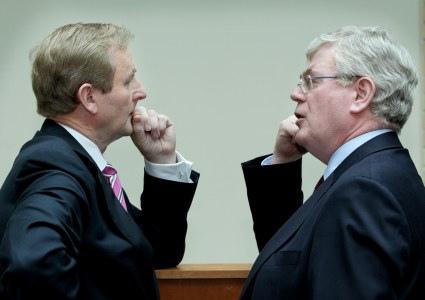Coalition heading for abortion showdown

There is a clear division between the two government parties on abortion, and also a clear necessity to bring clarity to the law. By Vincent Browne.
On Monday, 14 May 2007, during that year's general election campaign, I did an interview with Enda Kenny on behalf of Village magazine, which I then edited.
The interview - which is available to read here - took place in his car, which was being driven from New Ross to somewhere in Co Kilkenny. As we travelled, Kenny sat in the front with the driver. I sat in the back with one of Kenny's advisers, who intervened quite a bit in the course of the interview. One of the issues I raised was abortion, which resulted in the following exchanges:
Vincent Browne: On the question of abortion, promises were made in 1992 that, if the referendum on the substantive issue [to remove the threat of suicide on the part of a pregnant woman, as a basis for abortion] was defeated, legislation would be introduced to deal with the circumstances in which abortion is legal here. This has not happened. Are you proposing to do anything about that?
Enda Kenny: I am not. I will not introduce legislation on abortion.
Browne: But the reality is that abortion is legal here in certain circumstances and, in the absence of legislation, arguably, abortion could take place here of an eight-month-old foetus.
Kenny: I am very clear on this. I do not favour legislation on abortion.
Browne: So you are happy to have abortion here that would be entirely unregulated?
Kenny: We have had a very sensitive High Court case on abortion, and the High Court dealt with that, and certainly there is so much more we could do to limit the number of abortions abroad.
Browne: But since the X case [in 1992], it is clear that abortion is permissible here in certain instances. In one of the judgments in that case, one of the judges, Niall McCarthy, castigated the Oireachtas for its failure to introduce legislation following the passage of the first abortion referendum [in 1983]. Now, 15 years further on [from the X case], you are committing yourself to doing nothing.
Kenny: I do not favour legislation on abortion.
The Labour Party's view on abortion is stated in an answer to questions put to all parties on the issue by Choice Ireland. Labour said (while acknowledging deep divisions within the party on the issue): "The long-standing policy of the party is that legislation should be introduced to give effect to the X case judgment, and to give legal protection for current medical practice."
It adds: "In summary, the Labour Party is committed to bringing forward legislation, under the current constitutional position, to provide for the availability of a termination of pregnancy in the cases of: (i) a risk to the life of the woman, including the risk of suicide; (ii) foetal abnormality, which is such that the foetus will never be born alive; (iii) a risk of significant injury to the physical health of the mother."
On Thursday 15 November, Tánaiste Eamon Gilmore said in the Dáil: "It is 20 years since the Supreme Court made its finding in the X case. It is time to bring legal clarity to the issue."
It may be significant that he did not repeat "the long-standing policy of the party", but anyway, it is not possible to bring legal clarity to this issue without legislation or without a further constitutional amendment.
The suggestion that this could be done by way of a "clarifying statement" outside the ambit of law (as some in Fine Gael are now advocating) is nonsense, for such a clarification could have no legal effect.
There is a fudge - or, rather, a delaying ruse - on this in the Programme for Government. The relevant part reads: "We will establish an expert group to address [the] issue [of clarifying when and in what circumstances abortion is legal here], drawing on appropriate medical and legal expertise with a view to making recommendations to government on how this matter should be properly addressed."
That expert group is chaired by Mr Justice Sean Ryan, the High Court judge who chaired the Commission to Inquire into Child Abuse. Given his record as chairman of the earlier inquiry, I assume that any expert group chaired by him will not fail to pose the hard choices on abortion legislation.
The expert group device was concocted to get over the Fine Gael allergy to the merest suggestion that it is associated in any way with the "iniquity" of abortion. This might be the only surviving Fine Gael "core" value, now that the Civil War appears to be over.
There is a clear division between the two government parties, and also a clear necessity to bring legal clarity to the law on abortion. For instance, if the possibility of suicide by the mother constitutes a "substantial threat" to the life of the mother, does this not mean that any significant risk to the life of the mother is sufficient grounds for an abortion? That and many other issues need to be clarified by law.
So it now seems that there is an OK Corral-style showdown in prospect, once Minister for Health James Reilly is forced to publish the expert group report.
He should be able to string it out for about a month, by which time - it will be hoped - the indignation over the death of Savita Halappanavar will have abated, and the showdown may be less fatal to the survival of the government than now appears. The resolve of the present cabinet (particularly the older cohort of Labour ministers) to stick to their ministerial thrones cannot be underestimated.
But, as George Hamilton used to say: oh, danger here.
